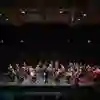



Want to write music for a living? Join our thriving creative community of performers, composers, producers, music psychologists, and fellow songwriters.
To thrive in today’s fast-moving music culture, you’ll need a wide range of musical and technical skills. And to be able to work confidently with others across professional contexts.
At Hull, you not only learn about music. You learn on the job, by making music. You work on major creative projects – both on your own and with like-minded creatives. Think live gigs, recordings, broadcasts, collaborations that span a range of genres, and more…
About this course
BA Music (Songwriting) is a variant of the BA Music programme. So you’ll share the same modules as other BA Music students. But when it comes to options within modules, you’ll focus on songwriting.
You'll study a range of technical skills to enable you to realise your best work. Project management, music theory, and lyric analysis. Fluency with key pieces of music software. Research skills, social media skills, and festival programming.
You'll receive robust training in the critical and contextual dimensions of the study of music. Working with expert staff to explore, interrogate and challenge received wisdom about the value, status and significance of music in our society. Your practical work will culminate in a large-scale project that will be a stepping stone into your chosen career.
And you can tap into our partnerships with the Royal Philharmonic Orchestra (RPO) and Opera North. RPO hold masterclasses and offer career advice. As well as ensemble coaching, one-to-one tuition, and work experience.
Music sounds better with us
Module options
Each year, you’ll study modules worth a certain number of credits, and you need 120 credits per year. Most modules are 20 credits – so you’ll study six modules each year. Some longer modules, such as a dissertation, are worth more. In these cases, you’ll study fewer modules - but the number of credits will always add up to 120. Some modules are compulsory, some are optional, so you can build a course that’s right for you.
Filters
Creating Recorded Music
Writer? Performer? Producer? Whatever your focus, you’ll work with fellow musicians to fully realise a musical recording. You’ll learn how to collaborate with others, each with different skills and roles, to create original music (including songwriting, instrumental works, electronic tracks and anything in-between) or to capture performance as a recorded artefact. You’ll finish the module with a portfolio-ready work.
core
20 credits
Creating Live Music
Channel your creativity into a live music event to develop your technical and artistic skills whatever your musical interests. You’ll collaborate with music and music production students to create a unique and original live music event, alongside developing core skills in project management, repertoire development and artistic presentation.
core
20 credits
Core Music Techniques
How does music work? How is it put together? Providing you with an essential proficiency in music theory and enabling you to realise your creative projects, you will develop your understanding of notation, harmony, melody, rhythm, alongside listening skills. You will form a portfolio for your final assessment from tasks across a variety of musical styles and techniques.
core
20 credits
Applied Music Skills
Get an in-depth understanding of how music is put together, along with how and why harmonic provides such a powerful force in music’s structure. Based on a range of musical styles, you’ll be given the tools and techniques to analyse structural and harmonic perspectives, and develop crucial listening skills for practical musicianship.
core
20 credits
Music, Criticism and Culture
Music can be profoundly significant for individuals in their daily lives, for politically-charged movements, and for entire cultures. This module will teach you different ways to ask such questions of music, and will help you to apply ideas derived from core literature to contemporary case studies.
core
20 credits
Music and its Histories
This introduces you to narratives that characterise histories of music across different historical periods, technologies, and styles. You will explore these while also pursuing specialist studies relevant to your degree pathway. Through a range of different music, you will look at their histories and the assumptions behind the construction of such histories.
core
20 credits
Individual Creative Project
What would you like to create? This module gives you the time, space, and expert support that you need to bring your individual project to life. You’ll be supported through planning, executing, and completion – which may be a performance, composition, recording, songwriting EP, educational practical project, or piece of sound design
core
20 credits
Collaborative Creative Project
Creative project management will explore the key methods used in a broad range of creative industries to organise and manage complex projects.
core
20 credits
Music and Its Objects
Explore how music has been shaped by the objects we associate with it: instruments, technologies, sound recordings, and notations. You will develop a critical approach to thinking about these, helping you to deepen your understanding of the historical context and critical significance of your own music-making activities.
core
20 credits
Our facilities

Watchlist
Dr Mark Slater
Course overview
2 mins
The Future of Music
Course Highlight
7 mins
Humber Street Sesh
Course Highlight
2 mins
Featured academics
From DJs to band members, stage performers to session musicians, our performance-led staff are active in making music themselves. And they bring their passion and experience into everything you learn.
So you can be sure you’re getting a great education.

Dr Mark Slater
Lecturer
Mark is a composer, producer and musicologist with an interest in the processes of how music is made, usually including uses of technology and improvisation in some way. His work is fuelled by an exploration of spontaneity and collaboration.

Dr Rowan Oliver
Senior Lecturer
Before joining the University of Hull, Rowan spent several years touring the world as the drummer in Goldfrapp (among various other musical exploits). He continues to record and perform internationally as a session musician.
Entry Requirements
What do I need?
This course is currently available through Clearing, which means our entry requirements are a bit different to what they would normally be.
At Hull, you're a name not a number. During Clearing, we look at all of your qualifications and experience, not just your academic grades. We may be able to offer you a place whatever your situation. Get started by completing our eligibility checker, and find out immediately if you could study at the University of Hull.
Have questions? Our admissions team will be happy to help.
Fees & Funding
How much is it?

Future prospects
You’ll graduate with essential skills for the music industry, plus, a professional portfolio of material for your CV. You’ll learn how to communicate confidently, both through your craft and face-to-face. You’ll also have access to our network of professional partners, providing opportunities for live projects, work experience, masterclasses, and more.
Some students set up record labels before they graduate. Others carve out their own careers in the industry. Our graduates go on to become musicians, composers, singer-songwriters, and recording artists. They also pursue careers as radio producers, music promoters, and events managers, as well as music therapists, teachers and journalists.
Become part of the next generation of futuremakers
Like what you've seen? Then it's time to apply.
The standard way is to apply through UCAS. This will give you the chance to showcase your skills qualities and passion for the subject, as well as providing us with your academic qualifications.
Not ready to apply yet?
Visit our next Open Day, and see all that the University of Hull has to offer. Talk to our lecturers about your subject, find out what university is really like from our current students, and take a tour of our beautiful campus and amazing facilities.
You may also be interested in...
100% employability (Music) UK domicile full-time first degree leavers; Higher Education Graduate Outcomes statistics, for the academic year 2022/23, published by the Higher Education Statistics Agency June 2025.
All modules presented on this course page are subject to availability and this list may change at any time.